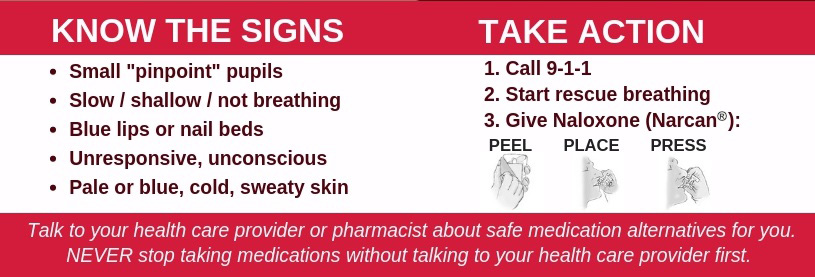Since 2015, Smilin’ Steves Pharmacies has been proud to partner with the Vermont Department of Health as well as local organizations to raise awareness about cautionary issues with Opioid use and misuse. We care about our patients and our communities and we are dedicated to doing what we can to help everyone stay as safe and healthy as possible.
Prescription opioids are prescribed by health care providers to help manage moderate to severe pain. For many, they can provide needed relief from either acute pain (ie. a sudden injury or surgery) or chronic pain (long term injury or illness). But taking prescription opioids, even as directed by your doctor, can also be potentially dangerous.
Our goal is to provide information and raise awareness about the risks of prescription opioid use such as unpleasant side effects, dependence, misuse, addiction, and overdose. We also want to share strategies for safely storing and properly disposing of unused/unwanted medications.
2021
We created an exciting and successful partnership with the 2021 students of the Stafford Technical Center Video Communications program. These high school program students, led by Instructor Cristina Kumka, worked with us to create three 30 second video PSA’s around prescription opioid topics.
Set up as a competition among students, each participant researched, wrote, and produced their own PSA related to the need for special cautions around prescription opioids. We received 10 video submissions, which were then reviewed and scored by over 40 individuals made up of professionals in the substance abuse field and diverse community members. We would like to thank the Project VISION Health Committee for their participation!
The video submissions were scored based on five categories: Visual, Audio, Story, Impact, and Viewers. Each category could score up to 20 points, for a total of 100 points. The highest scoring three videos won!
The three winning students each received a cash prize, and their videos were aired throughout June, 2021 on WCAX television, as well as PegTV. They were also invited to present their work to the June Project VISION meeting, which resulted in a newspaper article written about their work.
CONGRATULATIONS to the winning students:
1st PLACE VIDEO
Austin Gallagher, 18
West Rutland High School
2nd PLACE VIDEO
Corrigan Hanna, 17
Rutland High School
3rd PLACE VIDEO
Andrew Martell, 17
Fair Haven Union High School
ALSO in 2021
We are also pleased to announce a wonderful partnership with the 2021 students of the Castleton University ContentLab. These talented graphics arts students worked with us to create a series of opioid awareness posters for our local communities. A very special thank you to Professor William R. DeForest and his design students:
Brooke A. Rubright
Maggie Lewis
Mason A. Svayg
Zach Thompson
Richmond L. Rathbun
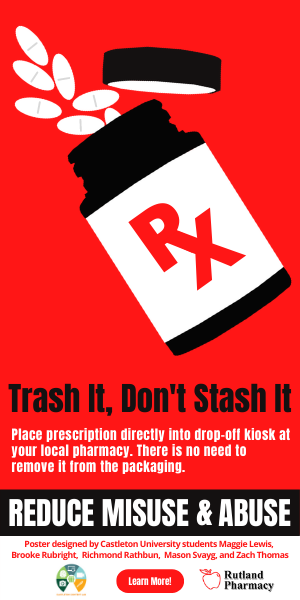 The posters are on display around Rutland County beginning in mid-May and aired on PegTV in June. The abbreviated graphics of the posters are featured online at WCAX in early-mid May and on social media, including Smilin Steve’s Facebook page. To view the full version of the posters, click on the graphics below!
The posters are on display around Rutland County beginning in mid-May and aired on PegTV in June. The abbreviated graphics of the posters are featured online at WCAX in early-mid May and on social media, including Smilin Steve’s Facebook page. To view the full version of the posters, click on the graphics below!
Many pharmacies, including the Smilin Steve Pharmacies, now have prescription drug drop boxes. This kiosk LOOKS like a mailbox, but it actually provides a safe and secure way for you to dispose of your unused/unwanted medications. Simply bring in your leftover medication either in a prescription bottle or a sealed bag (no liquids or sharps please!) and place it in the drop box. When the box is full, these medications are securely sent to an incinerator for destruction. This service is FREE and offers a convenient way to properly dispose of prescription drugs.
In addition to pharmacies, many law enforcement agencies also have permanent drop boxes.
DEA Take Back Days are typically scheduled for twice a year (usually in April and October) and are organized by local law enforcement, who collect and properly dispose of unwanted medications. Visit https://takebackday.dea.gov/ for more information.
Other options for proper disposal include prescription mail-back envelopes and deactivation. Visit https://www.fda.gov/drugs/safe-disposal-medicines/disposal-unused-medicines-what-you-should-know for more information.
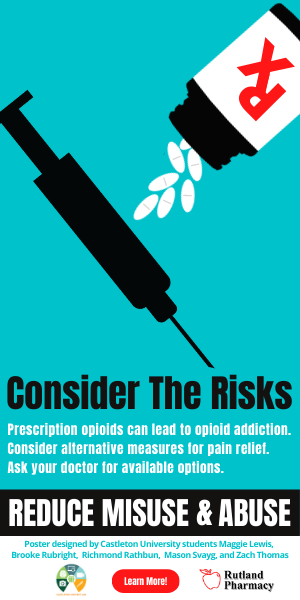 Prescription opioids are powerful pain medications that can be a beneficial treatment for severe pain. However, they also have serious risks that require extra care and attention. As stated on the CDC website, prescription opioids carry the serious risks of addiction, abuse, and overdose even when taken as directed. They can also have a number of other side effects, such as:
Prescription opioids are powerful pain medications that can be a beneficial treatment for severe pain. However, they also have serious risks that require extra care and attention. As stated on the CDC website, prescription opioids carry the serious risks of addiction, abuse, and overdose even when taken as directed. They can also have a number of other side effects, such as:
– Tolerance
– Physical dependence
– Increased sensitivity to pain
– Constipation
– Nausea, vomiting, and dry mouth
– Sleepiness and dizziness
– Confusion
– Depression
– Low levels of testosterone (lower sex drive & energy)
– Itching and sweating
Some people may be at increased risk when using prescription opioids. Examples include:
– Opioid use in high dose and frequency
– Pregnancy
– A history of substance use disorder
– A history of overdose
– Alcohol use
– Using benzodiazepines at the same time with opioids (ie. Xanax)
– Mental health disorders (ie. depression, anxiety)
To reduce the risks, these medications should only be used when absolutely necessary and only until pain can be managed using alternative pain relief measures. When using prescription opioids, it is important to talk to your doctor or pharmacist if you experience any of these, or other side effects.
 Taking a prescription opioid that is not prescribed to you, or offering yours to someone else, can have serious consequences. Not only is sharing these controlled medications illegal (federal and state law prohibits it), but a medication that is prescribed for one person may not be right for someone else.
Taking a prescription opioid that is not prescribed to you, or offering yours to someone else, can have serious consequences. Not only is sharing these controlled medications illegal (federal and state law prohibits it), but a medication that is prescribed for one person may not be right for someone else.
Doctors prescribe certain types and doses of opioid medications based on the illness or injury being treated as well as personal factors such as age, weight, substance use history, existing health conditions, alcohol use, and possible interactions with other medications, among other things. A medicine that is prescribed for you and your condition could be dangerous for someone else.
Only your doctor can tell you what medicine is right for you.
If you pick up an opioid prescription at any of our four Smilin Steve Pharmacy locations (Rutland Pharmacy, Ludlow Pharmacy, Springfield Pharmacy, and River Street Pharmacy), you may receive:
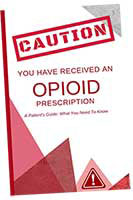 OPIOID BOOKLET
OPIOID BOOKLET
This booklet easily and conveniently highlights important information about your prescription such as what it is and how it works, risks of use and misuse, proper storage and safe disposal, and much more.
To download a copy of this booklet from your computer, just click on
the image to the right.
PRESCRIPTION OPIOID PACKAGING PRECAUTIONS
Taking multiple medications can sometimes get confusing, especially when the bottles all look alike! Mistakenly taking too much of a medication can be very dangerous, and this is true for prescription opioids. Our opioid medication packaging is designed to help you easily recognize your opioid prescription, helping you to remember how important it is to use it with caution and store it safely. You will notice:
- Red Caps: Our prescription bottles have white caps, so if you receive a red cap on your medication bottle, you will know that your prescription is an opioid and should be used and stored with caution.
- Cautionary Label: Your opioid prescription will now have a caution label that encourages you to learn more about opioid use at www.cdc.gov/RxAwareness
- DEA Schedule Identification: All opioids are controlled drugs. The DEA ranks them according to their potential for misuse, addiction, and risk of harm. Label instructions for opioids will now include the prescriptions DEA Schedule identity (Schedule II-V). See the opioid booklet above for a description of each Schedule.
ADDITIONAL SERVICES
FREE PRESCRIPTION MEDICATION MAIL-BACK ENVELOPE
Next to the pharmacy counter, you will notice a stand with a free prescription medication mail-back envelopes. These envelopes may be used to return any medication that is no longer needed or wanted. It is often the case that patients who receive an opioid prescription do not actually end up needing to use all of it. These envelopes are a smart way to make sure that those leftover prescriptions are not used for purposes other than intended, or by people that they were not prescribed for. Please feel free to take one!
PRESCRIPTION DRUG DROP BOX
When you come to the pharmacy to pick up your prescription, you will notice a prescription drug drop box near the counter. This kiosk LOOKS like a mailbox, but it actually provides a safe and secure way for you to dispose of your unused/unwanted medications. Simply bring in your leftover medication either in a prescription bottle or a sealed bag (no liquids or sharps please!) and place it in the drop box. When the box is full, these medications are securely sent to an incinerator for destruction. This service is FREE and offers a convenient way tp properly dispose of prescription drugs.
PHARMACIST CONSULTATION
Our Pharmacists are always available to answer any questions you may have. We are here to make your healthcare as easy and comfortable as possible!
Did you know that taking certain medications at the same time as an opioid may increase your risk of serious, potentially fatal, side effects? Doctors and pharmacies work hard to prevent negative interactions between medications. The more you know about potential interactions, the better!
Benzodiazepines, which are a class of medication that are often used to treat anxiety, panic disorders, insomnia, and other medical conditions, are not recommended for use with opioids. Both impact the central nervous system, which can lead to accidental overdose and slowed or stopped breathing. In fact, 30% of overdoses involving opioids also involve benzodiazepines.
Never make changes to or discontinue any medication without talking to your health care provider.
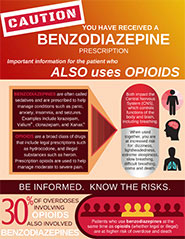
To download a copy of this flyer from your computer, just click on the image to the right.
In some circumstances, and with certain conditions, your health care provider may consider the possible side effects of taking a benzodiazepine when you are also using an opioid at the same time, and determine that your need for the medication outweighs the risks. If this is your situation, there are things you can do to help keep yourself safe:
- Never take more of any medication than prescribed. Use only as directed.
- If taking a benzodiazepine and an opioid, do not take them while alone, especially before you know how they will affect you.
- Keep naloxone (Narcan) with you and tell an adult who is with you how to use it. Narcan can be used to try to reverse the effects of an opioid overdose.
- Know the signs of overdose.
